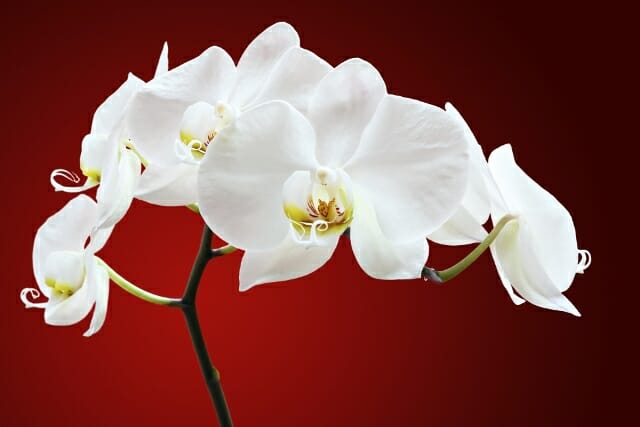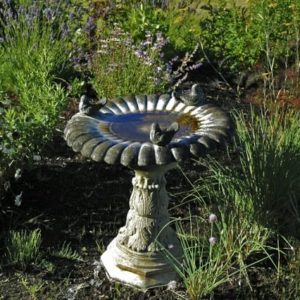
Looking for Mites and Other January Gardening Tips
Leonard Perry, UVM Extension Horticulturist
and Charlie Nardozzi, Horticulturist
 Checking houseplants for spider mites and other insects, cleaning bird feeders, and disinfecting seed starting containers are some of the gardening activities for this month.
Checking houseplants for spider mites and other insects, cleaning bird feeders, and disinfecting seed starting containers are some of the gardening activities for this month.
Aphids and spider mites may be multiplying like crazy amidst your houseplants, especially if they are grouped close together. Isolate each plant and inspect it closely with a magnifying glass if necessary. Aphids are easier to see, come in many colors, and move about on new growth and stems in particular. Look under leaves and where leaves join stems for the characteristic webbing of spider mites. Palms and English ivy are favorites of spider mites.
Treat these pests by holding the plant and pot upside down and submerging the foliage in a sink full of soapy water (wrap aluminum foil over the soil to keep it from falling out). Use a mild detergent, or weak solution, so not to damage the plant leaf surfaces. In severe cases, spray the plant with insecticidal soap or similar insecticide for indoors.
Birds deserve clean food surfaces as much as we do. Every few weeks bring the feeders inside and wash them with soap and water into which a little bleach has been added (one part bleach to nine parts water). Rinse thoroughly and dry.
If you have a heated bird bath (a good idea if you don’t), make sure to clean it every few days too. I have an old brush just for this purpose. Don’t use your kitchen one that is used on eating surfaces. Of course these can just be cleaned outdoors when filling them.
Take inventory of trays, pots, and six-packs from past years and discard any that are cracked. To get off to a clean start with seed starting this year, disinfect flats and pots in soapy water with bleach added: one part bleach to nine parts water. The longer you can soak them, the better, but at least try for 10 minutes. Then rinse well. Be sure to scrub off any soil before this cleansing rinse. If you prefer not to use bleach due to its chlorine fumes and caustic nature, a household disinfectant (such as the Lysol brand) can be used instead, with one part of it to two parts water.
If that geranium or coleus you’re overwintering inside has sent out spindly new shoots, keep trimming it back until the increased sunlight can support sturdier growth. If you have low light, keeping the plant in a cooler location (50 to 60 degrees F) may help.
 Orchids are one of the most popular flowering potted plants now, and a common one often found in garden stores and retail chain stores is the moth orchid (Phalaenopsis). When in flower, they need consistent temperatures of above 60 degrees at night and above 70 during the day. In New England, a south window in winter is not too much light, whereas it would be too much in summer.
Orchids are one of the most popular flowering potted plants now, and a common one often found in garden stores and retail chain stores is the moth orchid (Phalaenopsis). When in flower, they need consistent temperatures of above 60 degrees at night and above 70 during the day. In New England, a south window in winter is not too much light, whereas it would be too much in summer.
Fertilize orchids with a dilute liquid orchid fertilizer (high phosphorous, low nitrogen). Let the soil dry out somewhat between waterings but not get completely dry. The flowers can be damaged by gas from a stove, cigarette smoke, and other chemicals in the air. If buds drop before opening, raise the humidity with a room humidifier or by grouping plants together on top of pebbles in a tray with water up to the bottom of the pebbles.
Other gardening activities for this month include keeping bird feeders filled daily or as needed, checking stored summer bulbs (like dahlias) and root crops (like winter squash) for rots, and studying seed catalogs and online websites for new varieties for this year’s garden.
01/1/15
Charlie Nardozzi is a nationally known horticulturist, author, gardening consultant, and garden coach (CharlieNardozzi.com). Distribution of this release is made possible by New England Grows– a conference providing education for industry professionals and support for Extension’s outreach efforts in horticulture.
Receive your complimentary Relocation guide and magazine

